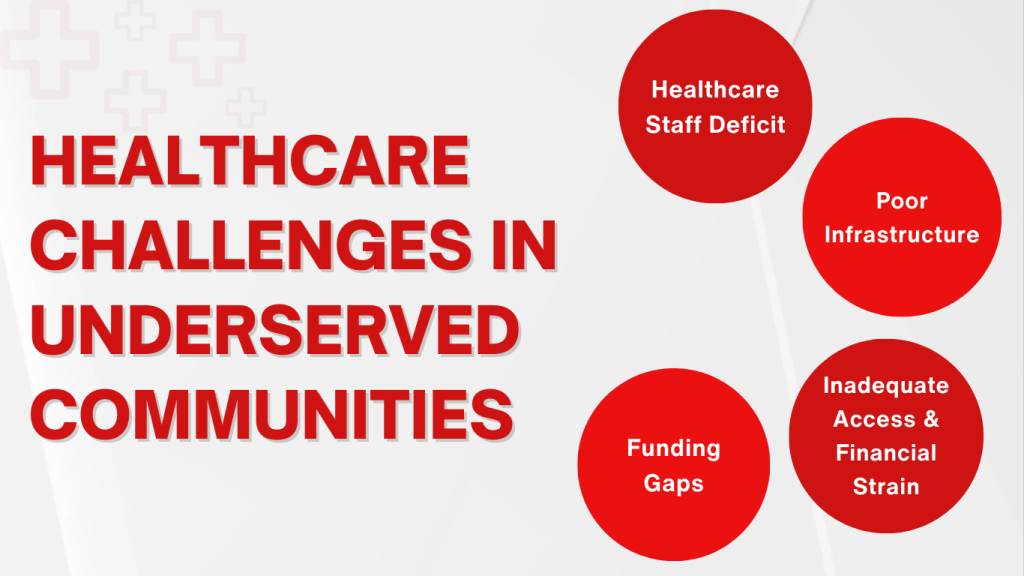
Africa, home to 18% of the global population, faces a staggering health crisis, accounting for approximately 50% of deaths from communicable diseases. This alarming reality stems from a lack of access to quality healthcare, with a significant portion of the population living over two hours away from the nearest health facility. Exploring the challenges within Africa’s healthcare system highlights the urgent need to improve access, especially in vulnerable communities. The continent’s ability to provide essential care is severely impacted by a shortage of healthcare workers, inadequate infrastructure, lack of funding, and limited resources.
Shortage of Healthcare Workers
Africa’s healthcare system faces a severe shortage of workers, with only 1.55 health workers per 1,000 people —far below the WHO’s recommended 4.45. This shortage, worsened by uneven distribution, inadequate training, and poor retention, makes it difficult to provide essential services. Some countries, like Niger, have as few as 0.25 workers per 1,000 people. With the shortage projected to reach 6.1 million by 2030, urgent investment in workforce training, recruitment, and retention is vital to strengthening Africa’s healthcare systems.
Inadequate Healthcare Infrastructure
Africa faces major health infrastructure challenges, especially in poorer and conflict-affected areas. Rural regions are particularly underserved, facing uneven distribution of services and low-quality facilities. In sub-Saharan Africa, only half of primary healthcare centers have access to clean water and sanitation, and just one-third have reliable electricity. This lack of basic resources severely limits their ability to address both communicable and noncommunicable diseases effectively.
Funding Gaps
Africa’s government currently invest $4.5 billion annually in healthcare infrastructure, far below the $26 billion needed each year to meet future health demands. The COVID-19 pandemic further strained resources, increasing debt and limiting funding for essential services. Donor support for health infrastructure has also been declining, leaving major gaps in secondary and tertiary care.
Access & Financial Strain
A report from the Africa Health Agenda International Conference Commission reveals that less than half of Africa’s population has access to essential healthcare. Each year, around 97 million Africans incur catastrophic healthcare costs, and 15 million are pushed into poverty due to out-of-pocket expenses.
The Importance of Pre-Hospital Care
In emergencies, every second counts, and timely intervention can make all the difference. Pre-hospital care is crucial for addressing critical gaps in emergency response, particularly in resource-limited areas. By training bystanders in first aid and CPR, community-based first responders can save lives and reduce preventable deaths by up to 25%. This is especially important in regions like rural Nigeria, where delays in medical care result in approximately 1.2 million preventable deaths each year.
Recognizing the critical need for effective emergency response, non-governmental organizations (NGOs) are increasingly adopting this cost-effective approach to enhance capabilities across Africa. One leading figure in this movement is Paschal Achunine, founder and Executive Director of Health Emergency Initiative (HEI) and an Ashoka Fellow. Paschal is changing the way emergency care is delivered by empowering everyday citizens to become first responders in critical situations. HEI has already trained over 46,000 first responders and aims to train over half a million more in the next three years.
In the coming months, HEI will train 270 Community Health Extension Workers (CHEWs), police officers, road safety personnel, nurses, and vehicle inspection officers as trainers of trainers (TOTs). These TOTs will then pass on their knowledge to over 12,000 community members, equipping them with essential emergency response skills. These initiatives transform bystanders from passive observers into active life-savers, fostering healthier and safer communities.
Make a Difference Today
Join us in our mission to improve healthcare access across Africa. Discover how you can get involved by visiting: https://hei.org.ng/get-involved/


i want to start this journey with this great asssociation